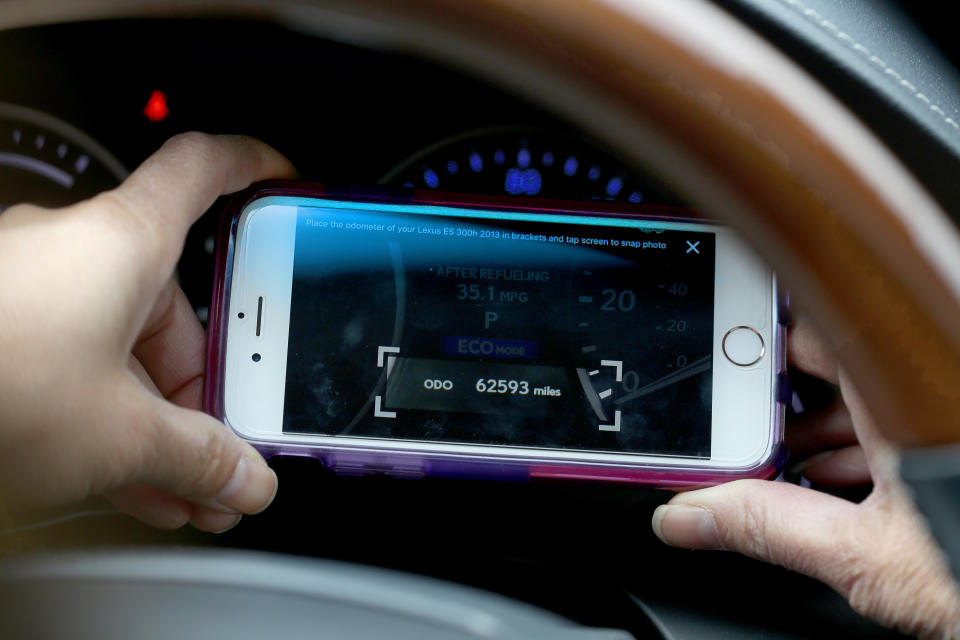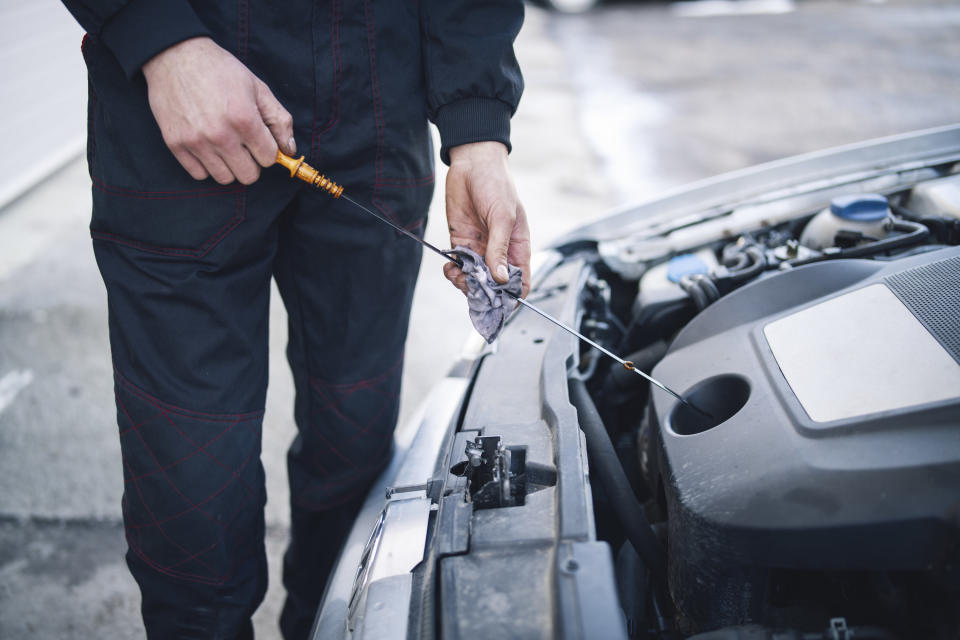15 Questions That Will Tell You If A Used Car Is A Steal Or A Rip-Off
Buying a brand-new car is not only expensive, but a new car loses value the moment you drive it off the lot — and it only gets worse from there.
NBC / Via Giphy / giphy.com
According to Carfax data, brand-new cars typically lose more than 10% of their value in the first month...and it keeps dropping.
Buying used is often the more budget-friendly way to go, but this comes with its own risks — like, what if the car breaks down in two weeks or had a shoddy engine repair?
NBC / Via Giphy / giphy.com
When you buy used, you can buy from a brick-and-mortar or online car dealer, a rental car company that sells off old rental cars, or buy directly from the seller.
For simplicity's sake, buying directly from the seller may be the best way to go, but if you have a car you want to trade in or are interested in buying a certified pre-owned car (often more expensive, but these are inspected and usually have a warranty), you'll need to go through a dealer.
Because navigating the used car world can be complicated (and stressful), I ran some car-buying questions by Patrick Olsen, the executive editor at Carfax, to see if I was on the right track.
Here are a few questions that can help you avoid a lemon and score a good deal:
1.Why are you selling this car?
Fox / Via Giphy / giphy.com
This question seems basic, but because it's so open-ended, Olsen says it might "be more revealing than sellers intend it to be."
They may say that they're looking for something more reliable (a sign that you might not want to plan a month-long road trip in the car) or tell you that they want to buy a car that does better on icy roads (a sign that you may want to rethink the purchase if you live in a snowy area).
2.What did you mainly use the car for?
Paramount Pictures / Via Giphy / giphy.com
This is a question Olsen suggested asking because the wear and tear on a used car will vary depending on how the vehicle was used. Long-haul trips and driving on unpaved roads will leave a vehicle in worse shape than daily errands or easy commutes.
3.What’s the car’s mileage?

If you're buying a car online, the mileage should be listed, but if you're talking to a private seller, you'll need to ask them how many miles the vehicle has on it.
To double-check the information you're given — there is such a thing as an odometer rollback, where the odometer is adjusted to increase a car's value — you might want to run a vehicle history report (available from Carfax), where you'll get clear-cut answers on mileage, the number of previous owners, how the car was used, if it was maintained, if it was in any accidents, and any outstanding recalls.
4.How many previous owners were there?
NBC / Via Giphy / giphy.com
In general, the fewer number of previous owners a car has had, the better. Chances are that a car that was driven by one person or family all its life was better cared for than a car that changed hands three or four times.
Again, a vehicle history report will give you an exact number of previous owners, but it may be telling to ask the seller yourself, too.
5.Has the car ever been in an accident?

Most vehicle history reports will alert you to any accidents, but if the accident was minor or wasn't reported to the insurance company, it might not be listed. Either way, this is a good question to ask, as you might get more detail than what the vehicle history report provides.
If you're looking at a vehicle history report, keep an eye out for a "salvage title," a title that's used to let buyers know that the car was once considered totaled or a total loss by the insurance company. These cars — which may be drivable after some repairs — often have hidden problems or a super-low resale value.
6.Can you provide me with the vehicle history report or give me the VIN number so I can look up the car?
Comedy Central / Via Giphy / giphy.com
Olsen strongly suggests looking at a car's vehicle history report. The seller may provide it for you, or you can look it up using the car's VIN number (although it'll cost you). Olsen says that "Good sellers will provide them as a sign that they’re on the up-and-up and have nothing to hide from buyers."
A vehicle history report includes the mileage, number of previous owners, accident history, how the car was used, title status, and vehicle recalls, among other things.
7.How was the car stored?
CBC / Via Giphy / giphy.com
The elements can be hard on a car — everything from mag chloride to severe cold and humidity can affect how a car looks and operates. A vehicle that was stored in a garage was likely less exposed (and you could argue, better cared for) than a car that sat outside year-round.
It might not be a deal breaker, but it's nice to know.
8.What parts have been replaced since you bought the car? What year were they replaced?

Depending on the part, hearing that something has been replaced may be a relief (after all, it means that you shouldn't have to replace it) or a concern (you want to make sure that the person who did the work did a good job and used quality parts).
Asking what year the part was replaced may give you an idea of how long the new part should hold up.
9.What work needs to be done on the car in the near future? And can I take it to my mechanic to get it checked out before I buy?
CBS / Via Giphy / giphy.com
The car's current owner may have an idea of what parts are on the brink of going out (or already need to be replaced). And while in an ideal world, sellers would be up front and honest, Olsen says that when you're buying used, you should always have a mechanic who you know and trust look over the car.
"Mechanics can see things consumers can’t," he said and suggested that "If the mechanic finds work that needs to be done, use that as a negotiating tool with the seller."
10.Is the car’s title available?
FX / Via Giphy / giphy.com
Olsen warns that you should "never pay until you have the title in hand," but notes that the title may still be at the bank or finance company if the car's current owner has an active lein on the vehicle.
11.How was the car maintained?

Cars take a lot of time and care to maintain, so asking how the seller maintained the car can be very telling. To dive deeper, you may ask how often they had the oil changed and if the car was serviced at a dealership or with an independent mechanic.
For proof of care, Olsen says you should "Ask for receipts" so you can see for yourself how the car was taken care of.
12.Can I take the car for a drive and test everything to see what’s working?
ABC / Via Giphy / giphy.com
Before you buy a used car — especially an older used car — you should ask the seller if there are any features that don’t work like they’re supposed to. Then, take it out for a spin to see how it drives, how you physically feel in it, and to make sure things like windows, the stereo, hazard lights, and seat belts are all in working condition.
13.What did you love — and what did you hate — about this car?
Comedy Central / Via Giphy / giphy.com
Olsen says this question "can be revealing," as it taps into the seller's emotions about their car and may reveal if it will be a good fit for you.
14.How does the listing price compare to the Kelley Blue Book Value or Carfax History-Based Value?
NBC / Via Giphy / giphy.com
You can obviously look this up yourself, but asking this question may force the seller to rethink the price if it's high or explain why they're selling the car for less.
You can check the value of the make and model on Kelley Blue Book (you'll need the year, mileage, and zip code), but to get specific information on the car in question, plug the VIN number or license plate number into the Carfax History-Based Value or Kelley Blue Book value calculator. This car-specific report will take into account any damage, special features, and the number of previous owners to give you the car's exact value.
15.And finally, is the price negotiable?
ABC / Via Giphy / giphy.com
Depending on what you find out about the car, you might be able to negotiate a lower rate (I mean, you might as well ask, right?). Things like a lower Kelley or Carfax value, significant repairs your mechanic finds, or problems you discover during the test drive are all valid reasons to ask for a lower price.
Have any tips that have helped you buy a used car in the past? Share away!
And for more stories about life and money, check out the rest of our personal finance posts.

